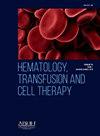睾酮对变性男性血液凝固标志物的影响
IF 1.6
Q3 HEMATOLOGY
引用次数: 0
摘要
背景:在跨性别男性的性别确认激素治疗中使用睾酮会产生一些不良反应。然而,关于静脉血栓栓塞风险的研究在这种治疗中仍然有限和不确定。本研究旨在评估肌内睾酮对跨性别男性特定直接和间接凝血标志物的影响。方法在一项变性人医疗服务机构的前瞻性观察研究中,对既往未使用睾酮的变性人进行随访。性别确认激素治疗开始于肌注cypionate睾酮(Depo-Testosterone)。在用药前和用药后12周评估凝血指标:凝血酶原时间、活化部分凝血活酶时间、d-二聚体、抗凝血酶、因子VIII和因子VII。结果共入组变性男性19例,平均年龄23.7±3.7岁。激素治疗12周后,观察到患者体重(p值= 0.002)和体重指数(p值= 0.007)显著增加。血清睾酮升高830% (p值= 0.000),血红蛋白升高7% (p值= 0.000),红细胞压积升高10% (p值= 0.001)。相反,高密度脂蛋白胆固醇水平下降10% (p值= 0.000),因子VII下降15% (p值= 0.000)。结论肌内睾酮与变性男性红细胞压积、血红蛋白、体重指数升高、高密度脂蛋白胆固醇和因子VII降低有关。然而,这些变量仍在正常参考值范围内。评估性别肯定激素治疗与睾酮需要长期随访研究,以确定适当的风险管理的静脉和动脉血栓栓塞在这一人群。本文章由计算机程序翻译,如有差异,请以英文原文为准。
Effect of testosterone on blood-clotting markers in transsexual men
Background
The use of testosterone in gender-affirming hormone therapy for trans men is associated with several adverse effects. However, research on the risk of venous thromboembolism in this treatment remains limited and inconclusive. This study aimed to assess the impact of intramuscular testosterone on specific direct and indirect blood-clotting markers in trans men.
Method
Treatment of trans men without previous use of testosterone was followed up in a prospective observational study in a trans people healthcare service. Gender-affirming hormone therapy was initiated with intramuscular testosterone cypionate (Depo-Testosterone). The blood-clotting markers prothrombin time, activated partial thromboplastin time, d-dimer, antithrombin, and factors VIII and VII were evaluated before and 12 weeks after starting the medication.
Results
Nineteen trans men with a mean age of 23.7 ± 3.7 years were enrolled. After 12 weeks of hormone therapy, significant increases in weight (p-value = 0.002) and body mass index (p-value = 0.007) were observed in patients. Furthermore, there were significant increases of 830 % in serum testosterone (p-value = 0.000), 7 % in hemoglobin (p-value = 0.000) and 10 % in hematocrit (p-value = 0.001). Conversely, a 10 % decrease in high density lipoprotein cholesterol levels (p-value = 0.000), and 15 % decrease in Factor VII (p-value = 0.000) were detected.
Conclusion
Intramuscular testosterone in trans men was associated with increases in hematocrit, hemoglobin, and the body mass index, and decreases in high density lipoprotein cholesterol and Factor VII. Nevertheless, these variables remained within normal reference values. Long-term follow-up studies evaluating gender-affirming hormone therapy with testosterone are needed to determine adequate risk management of venous and arterial thromboembolism in this population.
求助全文
通过发布文献求助,成功后即可免费获取论文全文。
去求助
来源期刊

Hematology, Transfusion and Cell Therapy
Multiple-
CiteScore
2.40
自引率
4.80%
发文量
1419
审稿时长
30 weeks
 求助内容:
求助内容: 应助结果提醒方式:
应助结果提醒方式:


